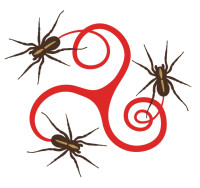New : Discover the congress illustrations by Jagoba Malumbres-Olarte :
"Dear all,
It was a real pleasure to attend the 2024 ECA in Rennes and to have the chance to illustrate your research. Some of you have already heard about my work but I would like to take this opportunity to present it properly.
As a researcher and ecologist myself, I know how necessary it is to communicate and disseminate our work inside and outside academia. That is why I work with researchers from a wide range of natural and social sciences who need original illustrations or infographics to portray their scientific work. I work in a wide variety of media types and styles, which I select depending on the subject, purpose and audience of the image: highly realistic portraits and stylized depictions for taxonomic publications; schematic diagrams for process-based research; creative illustrations to promote scientific publications and projects (summarising the take-home message for non-specialist audiences); educational images for readers of all ages; conference illustrations, in which I summarise the take-home message of a given seminar; or visual facilitation of scientific workshops. My illustrations may be used to advertise a conference in the local and (in)national media, inform about specific research or projects in the academic community, promote young researchers and their work, facilitate the understanding of the conclusions reached in workshops, illustrate scientific articles in conference proceedings, or as part of awards for recent outstanding research work.
If you are already thinking that such illustrations could be beneficial to explain, educate about, disseminate or promote your research, just contact me."
Jagoba Malumbres-Olarte (jagoba.malumbres.olarte@gmail.com, Instagram: @jmalumbresolarte)
European Congress of Arachnology 2024, Rennes
Here you can find the six illustrations that Jagoba created to summarise the four plenary sessions and two of the symposia from the 34th European Arachnology Congress (Rennes, 2024). The illustrations were created for the congress and to promote it, and to explain and disseminate the work of the attendees, so the organisers give you the right to use them however you want to (no copyrights issues here).
Symposium on arachnid genomics: The DNA strand in the image contains six of the subjects that genomics could potentially help investigate (from outside to inside of the spiral): the adaptation to new habitats (e.g. caves), DNA barcoding and phylogenetics, changes in DNA through colonisation and selection, predation and trophic interactions, mating behaviour and sexual dimorphism.
S. Pekar: This image shows the main 15 defense strategies that different arachnids can use (from top left, down to the centre and back up to the right): transparency, warning, background matching, anachoresis, chemical, countershading, Mullerian, thamatosis, behavioural, Batesian, camouflage, mechanical, startling, deflection and disruptive colouration, with the cornucopia that represents their diversity in the background.
R. Foelix: Just like the signs that indicate the blinspots of trucks, this image shows some examples of the blindspots of the “truck of spider research” (clock-wise): the pore fields where supposedly a special gland (cheliceral gland) opens to the outside (in the front), the handling of silk threads by the different claws (on the right), the structure and composition of spider cuticle (on the back) and the structural colors in spiders (on the left).
R. Gillespie: Here we can see a coin with the two sides of speciation (focused on islands), with Alfred Russell Wallace (the father of biogeography) in the background. In ecological speciation, as colonisation happens, there is an increase in the number of ecotypes, which occurs through the interactions with their environment. In geographic speciation, each island may have the same number if ecomorphs, which is driven by the interactions with close relatives.
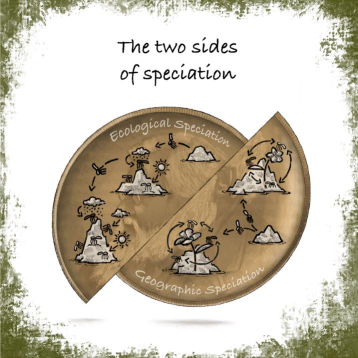
Symposium on spiders in agriculture: This image shows a spider that is preying on a caterpillar (representing the predatory role of spiders in agroecosystems) and holds five messages on its huge abdomen: the role of agroforestry in supporting spider diversity (top left), the effects of landscape factors on food webs (top right), the effects of fungicides on them (bottom right), the effects of farming techniques and droughts on them (bottom and centre) and the testing of the effects of birds and spiders through exclusion experiments (bottom left). The small spider at the bottom right of the image represents (in contrast with the large preying spider), the effects of differences in aggressiveness on predation.
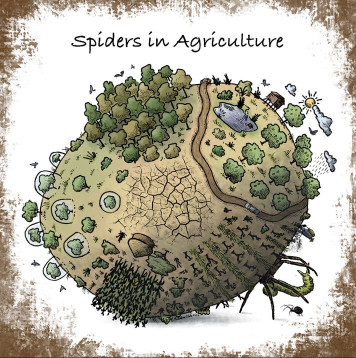
N. Dupérré: The famous “One ring to bring them all” phrase from “The Lord of The Rings” is the reference for this illustration. The ring has images of the different spider families that share a common morphologic feature: the sustentaculum, a seta that has been missed or ignored in many species.
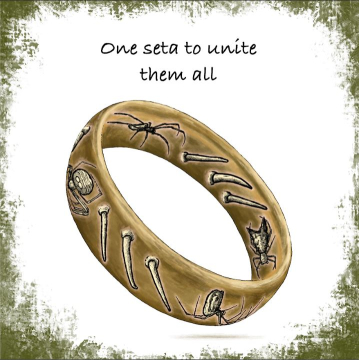
Dear all,
ECA 2024 Photo Contest Voting
We invite all participants to cast their votes in the ECA 2024 Photo Contest! The contest features two categories: General Arachnid Photography and Microscopy. Explore the submitted images and help us choose the winners by voting for your favorite in each category.
Voting is open until August 29. Click this link to access the voting form and make your selections.
Thank you!
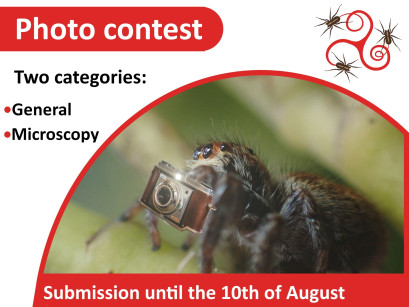
IMPORTANT:
- Several deadlines are approaching!
Deadline for submitting an abstract (via your Sciencesconf account) is extended to the 7th of June (but please be aware it will not be postponed anymore after that!). We now have 3 exciting symposium proposals: please visit the ECA and/or contact the organisers for more details! Registration (using 'AzurColloque') will close mid-June (15th).
- Symposia proposal: 1st June
- Pre-congress excursion: 1st June
- Grants application: 15th May
- Please note that the registration and payment deadline has been changed from 15 July to 30 June.
- To register to the congress, go to the "Registration" page from the main menu. Please note that the registration procedure does not include the submission of abstracts.
-To submit an abstract, you must first log in. If you do not yet have a Sciencesconf account, click on the arrow next to "Login" then "create account" to create your identifiers. Once you are logged in, you can fill in the submission form by going to the "new submission" page.
Dear friends and colleagues,
It is our great pleasure to invit all of you in Rennes (Brittany, France) for the next European Congress of Arachnology (34th ECA), to be held from the 26th to the 30th of August 2024. Please save the dates!
Rennes old town centre Saint-Malo Intra-Muros
Mont-Saint-Michel
